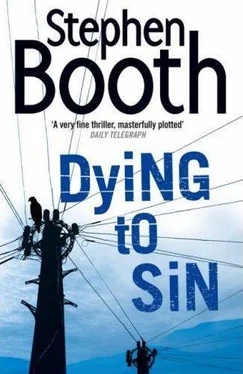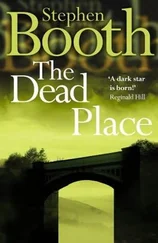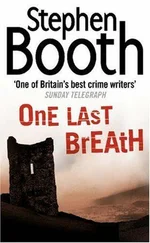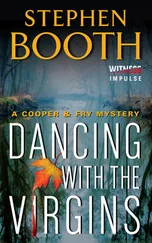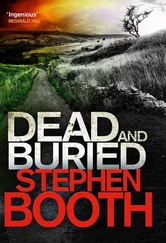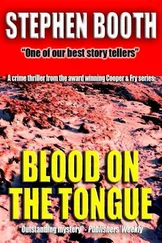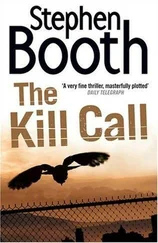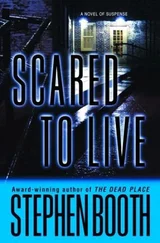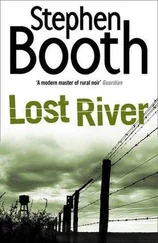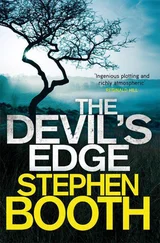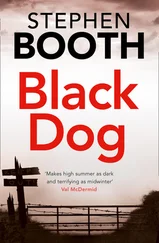Stephen Booth - Dying to Sin
Здесь есть возможность читать онлайн «Stephen Booth - Dying to Sin» — ознакомительный отрывок электронной книги совершенно бесплатно, а после прочтения отрывка купить полную версию. В некоторых случаях можно слушать аудио, скачать через торрент в формате fb2 и присутствует краткое содержание. Жанр: Полицейский детектив, на английском языке. Описание произведения, (предисловие) а так же отзывы посетителей доступны на портале библиотеки ЛибКат.
- Название:Dying to Sin
- Автор:
- Жанр:
- Год:неизвестен
- ISBN:нет данных
- Рейтинг книги:3 / 5. Голосов: 1
-
Избранное:Добавить в избранное
- Отзывы:
-
Ваша оценка:
- 60
- 1
- 2
- 3
- 4
- 5
Dying to Sin: краткое содержание, описание и аннотация
Предлагаем к чтению аннотацию, описание, краткое содержание или предисловие (зависит от того, что написал сам автор книги «Dying to Sin»). Если вы не нашли необходимую информацию о книге — напишите в комментариях, мы постараемся отыскать её.
Dying to Sin — читать онлайн ознакомительный отрывок
Ниже представлен текст книги, разбитый по страницам. Система сохранения места последней прочитанной страницы, позволяет с удобством читать онлайн бесплатно книгу «Dying to Sin», без необходимости каждый раз заново искать на чём Вы остановились. Поставьте закладку, и сможете в любой момент перейти на страницу, на которой закончили чтение.
Интервал:
Закладка:
Out here, though, you’d expect members of the public to have a bit of sympathy, and not to watch you dripping on their step without a flicker of concern.
But that was exactly what the first householder did, admitting that she’d heard of the Suttons of Pity Wood Farm, but she knew nothing about them, or anyone who’d ever worked there. At the second house, he got the same response. And at the third.
Cooper paused before calling at the end house, and studied the village. There wasn’t much in the way of Christmas decorations visible in Rakedale, but that was true of many Peak District villages. In Edendale, the streets were strung with lights, and almost every shop had a tree fixed to its upper storey, decorated and ready to be lit when darkness came. The same sort of thing could be found in other places — Castleton or Bakewell, for example.
But there was a difference. Some villages relied on income from tourism for their survival, and went out of their way to bring in visitors. Others had no interest in being tourist spots. Quite the opposite. Those were the places where residents didn’t want members of the public clogging their streets and peering into their gardens. In those villages, there were no visitor centres, no helpful signposts, no tea rooms or picnic sites. You could drive through some of them as often as you liked and find nowhere to park. ‘Keep moving’ was their message.
The last cottage in the row was empty, with green paint peeling off the door. On a side lane, where the woods started, Cooper found a 1950s bungalow strung with Christmas lights, and a chained Alsatian barking in a yard. He thought it looked more promising. But, frustratingly, it was the first property on his list where no one was at home. He made a note on the sheet and turned back towards the Methodist chapel, where he’d left the car.
The chapel was a square, unpretentious building standing between two farms. Primitive Methodist, according to the noticeboard. The name was a bit unsettling, but remarkably apt.
The fact that there was no parish church in Rakedale told Cooper something about the village. He was reminded of the old social division in rural communities — chapel for the workers, church for the squire. These non-conformist chapels were where the working classes had first learned to speak for themselves, to educate themselves, and to organize. They’d been a natural breeding ground for trade unions. Once working people had tasted religious freedom, they wanted political and social freedom, too. In some of these ancient villages, the parish church was still associated with the power wielded by the lord of the manor, a symbol of servitude. The priest took the squire’s money, and he preached what the squire wanted to hear.
But not in Rakedale. The nearest parish church must be in Biggin or Hartington. Villagers here were out of the gaze of any squire or landowner. And if the priest tried to visit, he would have been seen coming for miles.
Fry had made a deduction. Mud must be a perfectly normal occurrence in Rakedale. She had found brushes and scrapers by every front door for visitors with muddy boots. Not that she was allowed across the mat very often, but the possibility was at least hinted at in the provision of a scraper.
In other ways, too, everyone she spoke to seemed unsurprised to see her, as if they’d been warned in advance.
So it was a relief to come across the Dog Inn, a small pub set so far back from the road that it was almost hiding. For once, Fry didn’t have to expect some sour-faced woman in a baggy sweater blocking her way. It was a public house, and she was a member of the public. So she must be welcome, right?
The Dog Inn was entered through a tiny porch, its door at right angles to the main entrance to face away from the prevailing wind. The porch door was red, matching the Russian vine covering the walls and a row of three brick chimneys on the roof, and a horseshoe was nailed to the centre panel.
Inside, Fry found a small L-shaped bar with a settle against one wall, and an open fireplace with real logs burning in it and a stone chimney breast. A tiny side room held a pool table and a battered dartboard. A man with a long, grey beard was rolling cigarettes from a battered tobacco tin and brushing the remains of his tobacco off the racing page of the Daily Mirror . A few other men sat at tables further down the bar, all in complete silence. She felt sure it hadn’t been quite so silent before she walked in.
Fry was faced by a ‘Merry Christmas’ sign hanging from the beer pumps, and a row of Christmas figures over the bar counter — a few motley Santas and a snowman. She’d followed a trail of muddy paw prints into the bar that she guessed must belong to the collie dog lying on the floor.
On the jukebox she could see Now That’s What I Call Music — 1964 , a bit of Elvis Presley, and the Eagles’ Greatest Hits . The selections were numbered one to twelve down one side, and fourteen to twenty-five on the other. Twenty-eight choices of naff sixties and seventies pop hits. According to a sign, bed and breakfast at the Dog Inn was only twenty-five pounds a night. She didn’t feel tempted.
For a few minutes, Fry thought it was strange that no one seemed to be looking at her, as if they’d accepted her without curiosity. But then she realized that they were watching her, after all. They were making an elaborate pretence of not noticing her, but they were observing out of the corners of their eyes, letting their gaze sweep casually across her as if she wasn’t there, but registering more and more details about her each time they turned their heads. Bystanders were notoriously poor at remembering descriptions, but these people would be able to draw her accurately from memory, each and every one of them. They were all watching her.
As she waited, a desultory conversation started up about the weather. Wasn’t it wet and cold and windy, they said. Wetter and colder and windier than usual for this time of year. It would probably be even wetter and colder over Christmas, just their luck. Somebody must have stood on an ant.
Fry finally got some attention when a middle-aged man emerged from a door behind the bar. He was wearing an old cardigan and carrying a mug of tea with ‘Number One Dad’ printed on it. He introduced himself as Ned Dain, the licensee.
‘The Suttons?’ he said. ‘I remember the two old men. They’re not still at the farm, surely?’
‘No.’
‘I thought not. We haven’t seen them in here for ages. Died, did they?’
‘Only one of them did.’
‘Damn.’
‘What do you mean by that?’
‘Well, I bet that would be really hard on the other brother,’ said Dain. ‘They were so close they were almost like twins. Spoke the same, had a similar manner. Yet someone told me once they didn’t see eye to eye on a lot of things. They kept it hidden well, if that was the case.’ He took a sip of tea. ‘There were a few years between them in age, I think.’
‘We’ve been told Derek was the youngest by four years.’
‘Is he the one that died?’
‘That’s right.’
‘Damn.’
The men in the bar had moved on to discussing the Middle East problem, and whether anyone had seen the darts on the telly last night.
‘Can you tell me anything else about them?’
‘They always kept themselves pretty much to themselves,’ said Dain. ‘But there’s usually somebody who knows something around here. What did you want to know?’
‘Was either of them married, for example?’
‘Hold on. Hey, Jack!’
The man with the long, grey beard looked up. ‘Aye?’
‘The Sutton brothers at Pity Wood — was one of them married?’
Jack glanced slyly at Fry before answering. ‘I don’t rightly recall. Might have been. It was a long time ago, if so.’
Читать дальшеИнтервал:
Закладка:
Похожие книги на «Dying to Sin»
Представляем Вашему вниманию похожие книги на «Dying to Sin» списком для выбора. Мы отобрали схожую по названию и смыслу литературу в надежде предоставить читателям больше вариантов отыскать новые, интересные, ещё непрочитанные произведения.
Обсуждение, отзывы о книге «Dying to Sin» и просто собственные мнения читателей. Оставьте ваши комментарии, напишите, что Вы думаете о произведении, его смысле или главных героях. Укажите что конкретно понравилось, а что нет, и почему Вы так считаете.
